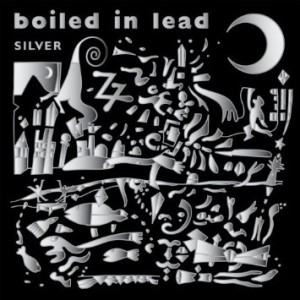 Before commenting on Boiled in Lead’s Silver, CD, let me stress one point: “punk” is a general descriptive term denoting, most often, a subgenre. Thus we have celtopunk, Christian punk, glam punk, and any number of other punks in music. In books we have steampunk, mannerpunk, and most recently, brickpunk. (Seriously. One of the three great stories of brickpunk is “The Three Little Pigs.” Think about that for a while.)
Before commenting on Boiled in Lead’s Silver, CD, let me stress one point: “punk” is a general descriptive term denoting, most often, a subgenre. Thus we have celtopunk, Christian punk, glam punk, and any number of other punks in music. In books we have steampunk, mannerpunk, and most recently, brickpunk. (Seriously. One of the three great stories of brickpunk is “The Three Little Pigs.” Think about that for a while.)
So forget about the extreme haircuts, body modification and bizarre modes of dress, except insofar as they are part of youth culture in general.
I’m not going to try to trace the development of the influence of Celtic music on popular music, except to note that things Celtic have seen a huge revival in popularity in recent years and it’s only to be expected that somewhere, somehow, that would make its way into popular music. (Actually, it didn’t take long at all — remember Enya’s big crossover hits?) There are a number of groups billed as “celtopunk” bands – The Pogues, Real McKenzies, Flogging Molly, and, certainly not least, Boiled in Lead. They are as variable as anything else in this world.
The relative importance of Celtic influences and pop traditions (yes, there is such a thing) in any band’s songs is by no means something that can be pinned down easily, particularly since within the duration of one collection, we are usually subjected to a range from almost pure Celtic to almost pure pop. In Silver, for example, “The Sunset” struck me as pretty much a standard pop song based on a traditional tune — but ultimately more pop than trad — while a song such as “House Carpenter” is almost pure Irish. (It is, in fact, a traditional tune arranged by Boiled in Lead.)
It occurs to me that “celtopunk” is too limiting a term. “Berber,” which follows immediately after “House Carpenter,” is unclassifiable. It claims to be a direct result of Robin Adnan Anders’ encounter with the Berbers on a camel trek through southern Morocco. OK – but don’t tell me it hasn’t been “translated”: there is some vaguely North-African sounding work on the guitars over a movie-soundtrack base — call it a continuo — played for maximum drama, with some world-beat drumwork popping up here and there. Don’t get me wrong — it’s a fabulous tune. It’s just sort of puzzling, albeit a lot of fun, trying to figure out where it came from. Another tune from North Africa, “Menfi,” gets “opened up” in very interesting ways. There’s some definite jazz/blues influences on the guitars in that one.
And, after that is all said, it just goes to show that there’s a lot of meat in this collection. I had been enthusiastic about BiL’s work on Songs from The Gypsy, which appears to have been a distinct departure for them (but maybe not so much), but even with changes in personnel, the high level of musicianship and what I can only see as an intense focus are still there. These guys are good, no two ways about it. In fact, Silver is a something better than good.
As of this release, Boiled in Lead consists of Robin Adnan Anders, percussion; Dean Magraw, guitar; Todd Menton, vocals, guitars, and a host of other instruments; Drew Miller, bass and dulcimer; and David Stehshoel, fiddle and zurna.
(Omnium Records, 2008)
